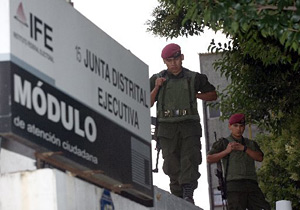 |
 |
 |
 Editorials | July 2006 Editorials | July 2006  
What the Mexican Vote Can Tell Us
 Andres Oppenheimer - Fort Worth Star-Telegram Andres Oppenheimer - Fort Worth Star-Telegram


| | Mexican soldiers guard the roof of the 15th Electoral District Office in Mexico City, where Democratic Revolutionary Party (PRD) presented 152 lawsuits demanding a full recount of the July 2 presidential election, July 9, 2006. It'll be up to the Federal Electoral Tribunal, known by its Spanish acronym TRIFE, to determine whether there were irregularities that warrant opening up and counting the more than 41 million ballots cast. (Heriberto Rodriguez/MCT) |
Here are five lessons to be learned from Mexico's July 2 presidential election, which according to official figures was won by center-right candidate Felipe Calderon but is being contested by left-of-center candidate Andres Manuel Lopez Obrador.

First, Mexico's three-party system badly needs a runoff election in order to elect politically stronger presidents. If he overcomes the legal challenges to his victory, as expected, Calderon will be the weakest president in Mexico's recent history.

Former President Ernesto Zedillo won the 1994 elections with 50 percent of the vote, and President Vicente Fox won the 2000 election with 43 percent of the vote. Calderon was proclaimed the winner with less than 36 percent of the vote.

Calderon's party (PAN) will have a 42 percent minority in Congress and will need the support of the once-ruling Institutional Revolutionary Party (PRI) to pass key reforms. Mexico's failure to pass energy, labor and fiscal reforms during the past five years has left the country increasingly behind China, India and Central Europe in the global race for investments.

Fox is proposing that future elections include a possible runoff vote. Others, such as American University's Mexico expert Robert Pastor, are proposing an instant runoff vote, as is done in Ireland, in which voters would pick their first and second choices for president at once.

Second, Mexico's left has to modernize because it is becoming the party of older people and rural dwellers in a country that is increasingly young and urban. According to exit polls by the dailies Reforma and El Universal, a majority of young voters supported Calderon, while a majority of older voters supported Lopez Obrador.

Among voters age 18 to 29, Calderon got 38 percent of the vote, while his leftist rival got 34 percent. Conversely, among voters age 50 and older, Lopez Obrador got 37 percent of the vote, while Calderon got 34 percent, the Reforma exit poll shows.

Pollsters say Calderon's pragmatic campaign slogan - 'More investments, more jobs' - proved to be more attractive to young voters than Lopez Obrador's more ideological message, calling for social justice.

Third, fear campaigns work. Calderon's claims that Lopez Obrador is a dangerous populist whose victory would have triggered capital flight, economic decline and inflation scared many voters. In a country where the economy is growing by a reasonably healthy 4 percent this year and where poverty has been reduced from nearly 54 to 47 percent during the past five years, many voters decided not to take any risks.

'People didn't necessarily vote for Calderon. They voted against Lopez Obrador,' says Francisco Abundis of the Parametria polling firm. 'They did so because of a combination of fear and rejection.'

Fourth, if Lopez Obrador's vote recount appeal fails, his political future is at risk. Mexico City's mayor-elect, Marcelo Ebrard, who won by a landslide, may seek the leftist party's nomination for the 2012 elections.

Many Mexicans are giving Lopez Obrador the benefit of the doubt, citing Al Gore's demand for a recount in the 2000 U.S. elections. But Gore didn't convene street protests. If Lopez Obrador's recount campaign becomes violent and he loses his legal appeal, he will look like a sore loser and may have a hard time becoming a viable candidate in 2012.

Fifth, political analysts' contentions that a leftist wave is sweeping the hemisphere might have to be revised. In the latest elections in Mexico, Canada, Peru, Colombia and Costa Rica, the winners were the most pro-free-trade candidates.

There is no leftist tsunami in the region. At best, the region is evenly split.

My conclusion: If Calderon is confirmed, his party will have to shift to the center and make concessions to left-of-center PRI legislators in order to govern effectively. And Lopez Obrador's leftist party, the PRD, will have to move to the center, too, to win over young voters and prove that it's much more than a party of pensioners and peasants.

That's all good news. As weird as it sounds, given the scary headlines from Latin America, Mexico and the rest of the region may be gradually shifting away from the extremes and could be moving toward a period of greater stability and greater prosperity. | 
 | |
 |



